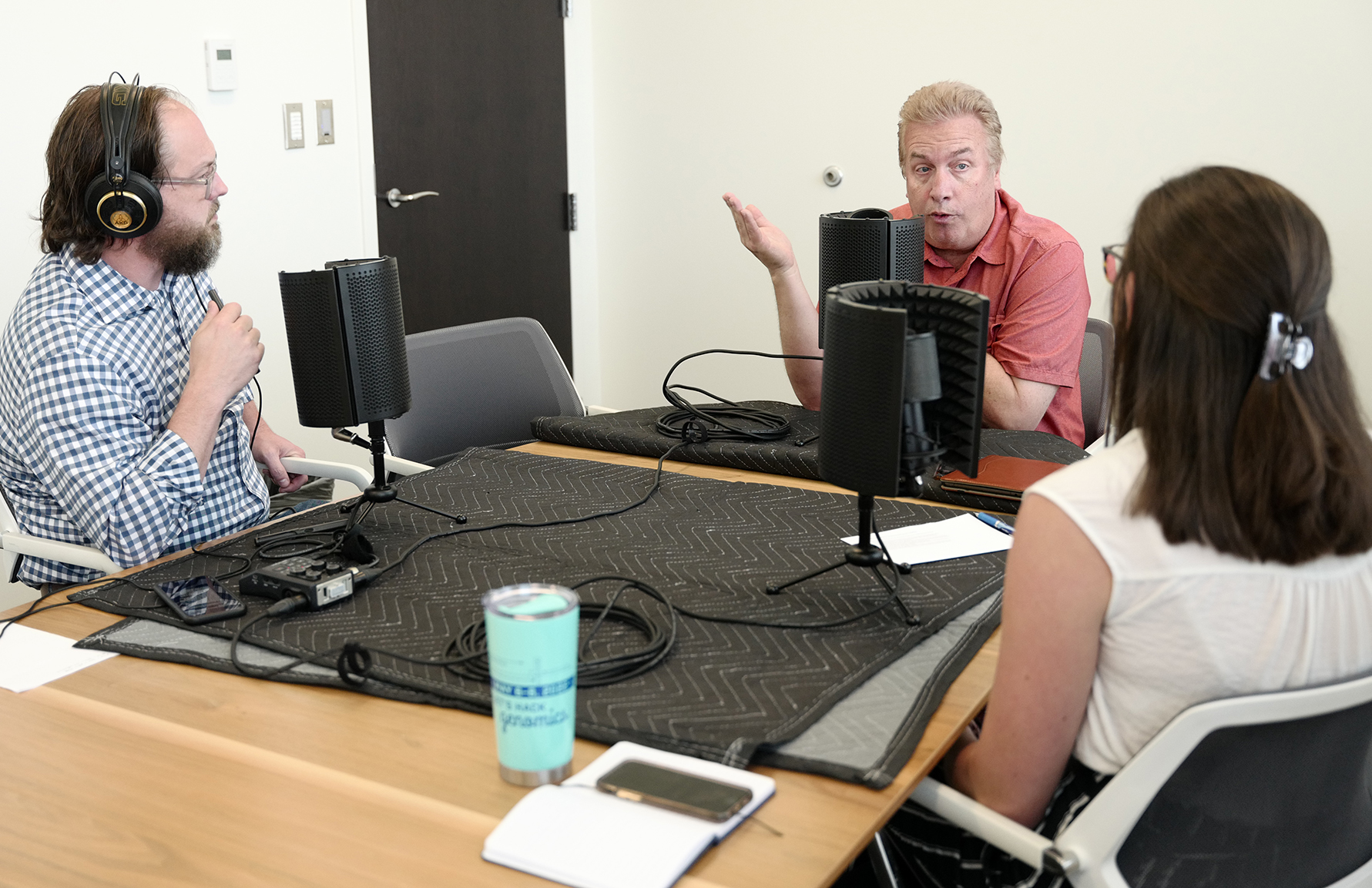
Our first expedition of this season described how DNA can help scientists and genealogists construct a family history, spanning a dozen generations. But it turns out, you can learn a lot more from your DNA than just where your ancestors are from.
 Genetic testing has shown promise in the healthcare industry, helping physicians diagnose and treat diseases, determining an individual’s potential for eventually developing a disease, and more accurately prescribing medications. With the growing availability of genetic testing comes growing concerns about the implications of an individual’s genetic information being out in the world.
Genetic testing has shown promise in the healthcare industry, helping physicians diagnose and treat diseases, determining an individual’s potential for eventually developing a disease, and more accurately prescribing medications. With the growing availability of genetic testing comes growing concerns about the implications of an individual’s genetic information being out in the world.
Like your fingerprints, DNA is unique to you. It can accurately identify you among all of the other people in the world. It can also predict whether you might develop a disease in the future. For these reasons, questions like ‘Who has access to my genetic information?’, ‘Will my genetic information negatively affect my health insurance premium?’, and ‘Can law enforcement use my genetic information to connect me or a family member to a crime?’ are commonly attached to discussions about the value of genetic information. Listen to Tiny Expeditions Season 3, Episode 2, “Keep your data to yourself: a conversation on bioethics and genetic testing”, to journey into the world of bioethics and hear how experts are helping to ensure that genetic data is appropriately protected but also equally beneficial for all.
Behind the Scenes


Thomas May, PhD (pictured top left) is a bioethicist at Washington State University and HudsonAlpha Institute for Biotechnology. He primarily resides in California, so we were extremely excited to be able to chat with Dr. May in person at HudsonAlpha’s campus.
As Dr. May mentioned, his primary area of expertise revolves around the ethical, legal, and social implications of the rising use of genetic testing in both clinical and non-clinical settings. He helps answer questions like “Who can and cannot access genetic data?”, “How do we ensure the fair and equitable distribution of genetic testing?”, and “What are the most appropriate genetic panels for certain situations?”.
During this episode, you also heard from HudsonAlpha’s president Neil Lamb, PhD (pictured bottom left). Dr. Lamb is a geneticist by training but has spent the past few decades bringing information about the wonders of genetics to students, educators, and the general public. We were lucky enough to bring Dr. Lamb onto the podcast to help us understand the history of genetic testing and the ways through which genetic tests are validated.

Sarah Sharman 00:00
Season Three of Tiny Expeditions is made possible through the support of our sponsor EBSCO Information Services, the leading provider of online research content search technologies and workflow tools, serving public libraries, schools, academic institutions, corporations, and medical institutions around the world. Proudly delivering information access for researchers at all levels. Online at EBSCO.com. That’s E B S C O dot com.
Chris Powell 00:36
Welcome to Season Three of Tiny Expeditions. This is episode two. And this is a full episode. We are back, ladies and gentlemen, and my name is Chris Powell. I’m going to be your storytelling guide for today’s episode.
Sarah Sharman 00:47
And I’m Dr. Sarah Sharman here to help you understand the science. As always, this season is all about human health. We’ve explored what our DNA can tell us about our ancestry, which, yes, is more about where we came from rather than how DNA affects our health. But it’s good stuff, nonetheless.
Neil Lamb 01:05
Before the completion of the Human Genome Project, and really even in the early years after that, genetics was still seen as a very small specialty component of medicine.
Chris Powell 01:16
That’s the voice of Dr. Neil Lamb, the president of the HudsonAlpha Institute for Biotechnology,
Neil Lamb 01:20
Since the sequencing of the human genome project, and really since all of the research that’s followed on from that, we’ve seen genomics and the ability to do genetic tests break into so many specialty areas. Oncology comes to mind. The whole field of oncology has been transformed by having the power of knowing the genetic mutations that drive that cancer and shape the choice around therapy. We’re beginning to see that in other specialty areas, as well. And I think we are going to reach a place, maybe not all specialty areas, but a number of them will use genomics as an important tool. And that will come to a doctor’s office already armed with background information about our genomic information, about our predispositions to certain diseases, and about which types of medicine will and won’t work for us. That’s incredibly exciting that that means we come to a conversation already ahead of the game of where we were even 10 years ago.
Chris Powell 02:25
So, Sarah, I’m curious, have you ever done or thought about doing genetic testing?
Sarah Sharman 02:30
Yes, I participated in HudsonAlpha’s Information is Power initiative. And this is a program that offers cancer screening to individuals, and it looks at about 56 cancer predisposition genes. So, I did this to gain a knowledge about my cancer risk so that I could share that with my doctor. What about you, Chris?
Chris Powell 02:48
Yes. So, I also did a HudsonAlpha program that was offered to employees to where they were able to give us pharmacogenetic testing. And that allowed me to take a report back to my doctor to show what medicines will or will not work with me. And it was very insightful, and I enjoyed getting to take that back. So, it could become part of my routine care. Even though I was excited to participate in the program, I still had a question regarding the data. Like, I don’t know, if you have the same question like what happens to the data? Once it’s collected? Like who owns that? Can it be used for anything else? Did you have any of the same concerns?
Sarah Sharman 03:21
Although I’m generally a pretty positive person, I will admit that I had some concerns when I did genetic testing, like you mentioned, who can access and use my genetic data, because when it all comes down to it, DNA is effectively your genetic fingerprint. It is unique to you, and it can differentiate you from everyone else in the world.
Chris Powell 03:40
So, Sarah, it sounds like today’s episode is perfect for both of us. We can both learn a lot. We’re going to be talking with our resident bioethics expert, Dr. Thomas May.
Thomas May 03:50
My name is Thomas May. I am a professor of bioethics at the Elson S. Floyd College of Medicine at Washington State University and a research faculty member at HudsonAlpha Institute for Biotechnology. So, bioethics is really the application of moral philosophy to health care and public health. So, it’s looking at not only clinical health care, a lot of its early advent, I think, was in things like withholding and withdrawing treatment decisions. You might have been familiar with classic cases such as Nancy Cruzan or Karen Ann Quinlan, where we had patients who were in a persistent vegetative state and were being kept biologically alive artificially through machines and the questions arose about whether or not it’s appropriate to continue that or, in some cases it might be appropriate to withdraw. Those were some early issues there. It also was used early on, I believe, in research ethics, as it pertained to human subject testing for health purposes. So, you are probably familiar with the Tuskegee syphilis experiment that occurred in Tuskegee, Alabama.
Sarah Sharman 05:15
The Tuskegee syphilis study was an unethical experiment conducted by the U.S. government that spanned 40 years. The goal was to observe the natural history of untreated syphilis in black populations. Researchers did not obtain proper consent from participants, which means that they didn’t tell them what the experiment would entail. Subjects were completely unaware that they even had syphilis. Even after penicillin was proven to be an effective treatment for syphilis, the researchers continued to withhold treatment from the individual.
Chris Powell 05:47
In total, more than 600 African Americans were enrolled in the study. Of that 600, approximately 400 would end up testing positive for syphilis, the other 200 represented the control for the experiment. More than 100 men died as a result of the study. This does not account for the lasting effects of the study on the African American community. And the distrust that was sowed because of this. The study officially ended in 1972, after being exposed by a journalist, and an official apology from the U.S. government did not come until 1997.
Thomas May 06:22
The result of that was a recognized need to establish reviews of biomedical research protocols, recognizing that the individuals involved could have used guidance and oversight from a different perspective about the appropriateness of that research, and IRB s were established as a result of that institutional review board. So, these are some of the early advocates, right. But we also see it applied to things like public health, where we see questions about just using a purely hypothetical, you know if there was a pandemic, should we have masking or vaccinations? And how should we approach those on a voluntary basis or mandatory basis? Those are ethical issues, or at least partially ethical issues that exist within the public health realm, that are also part of bioethics. So, to answer your question, it’s not easy to answer it in a short definition, in its most basic form, bioethics is the application of moral philosophy to the biomedical realm.
Chris Powell 07:37
In order to talk matters of public health, we inevitably Sarah have to talk about the P word. That’s right. Politics, we have to bring politics into this now. Some health issues have been so politicized that it’s hard to talk about them. But what if the P word is actually something that could help us out? What if we could use political processes in order to help protect our information, and what’s done with it?
Thomas May 08:03
So, there are issues surrounding things like regulation of genomic technologies, what informed consent requires and consists of access issues concerning fair and equitable distribution of benefits and burdens of genomic research, and the legalities concerning things like discrimination and protections against discrimination, and certain laws and regulations that we might introduce into our society. So, a lot of these rules and regulations differ between states, but there is a federal law called the Genetic Information Non-discrimination Act. The acronym is usually referred to as GINA. And what it does is it offers some protections against the use of genetic information about a person in order to set health insurance premiums or make decisions about whether to cover a person with health insurance, and about whether or not that information can be used as a basis of hiring or firing an individual.
Sarah Sharman 09:11
You probably noticed that Dr. May said ‘some protections.’ There are actually several caveats to the protections that GINA does and does not afford individuals.
Thomas May 09:21
There are certain gaps that exist within GINA. For example, although it does not allow for the use of genetic information for setting health insurance premiums or deciding whether to cover someone in health insurance, it can be used for life insurance, long-term care, or disability insurance. So, there’s some gaps that exist there, as well as the employment discrimination protections that are applicable only to employers with 15 or more employees. So, a significant portion of the jobs in the United States are in small businesses that might not have 15 employees. And there, your genetic information could be used in a way that would disadvantage you for employment.
Chris Powell 10:06
Another possible gap that could exist is that of data privacy.
Thomas May 10:10
Well, this is an area that’s really a lot of people call the wild west of genomic information because it’s such a new technology. And it’s such a new ability that we really don’t have a lot of laws and regulations in place that speak to this yet, although a lot of places are concerned with it. Companies are already sort of introducing personal assurances to their clients, if you will, that the information will not be provided to law enforcement without a subpoena, or other sorts of reason for obtaining it. However, a lot of this information can be obtained surreptitiously as well. This awareness of this issue sort of began with the identification of the Golden State killer in California. And what happened there was that law enforcement had submitted the genetic profile of an individual to a genetic database, I believe it was GED Match. And they were able to find a distant relative of the individual. Once they were able to identify the family tree, they could follow that tree and identify a limited number of individuals who could have been the Golden State killer due to being in the right locations at the right time. So, they were able to then follow those people and surreptitiously obtain a DNA sample that they could compare to the Golden State killer’s. And this is how they were able to identify the Golden State killer. The point being, however, that both the obtaining of the samples that they ultimately use to identify the killer, as well as the database, sort of this submission to the database. None of this was done by the Golden State killer himself. It’s for this reason I think a lot of people think we need some serious consideration of exactly how to regulate this information and protect privacy for those individuals who want that protected.
Sarah Sharman 12:21
Beyond the legal issues we’ve discussed, there are also ethical issues surrounding the use of genetic testing and genetic information to diagnose diseases and inform treatment. For example, how much data should we have to validate that a genetic change actually associates with a disease?
Neil Lamb 12:38
There are different levels of competence associated with different kinds of genetic tests. In some cases, if you have a specific DNA change, that is a slam dunk that you have this disease or you will develop this disease. In other cases, the data is less certain. There may be a number of individuals who had this mutation, but for whatever reason, they don’t always show symptoms or show it on a less severe scale. And so, there’s a level of confidence that’s associated with that. And then you’ve got tests where we have one or two scientific papers that have been published that show an association. But we don’t have a clear correlation between that genetic link and the actual symptoms or traits. So, there’s really an entire continuum of the evidence base and the competence around what a piece of data would give you. It’s also important to think about where your information is coming from. It’s one thing if your physician orders a genetic test from a clinically approved testing lab to try to give you a specific answer. It’s another thing if you do a cheek swab with an online direct-to-consumer organization and then you bring that information to your physician.
Chris Powell 13:54
Motivation is important. For those of us who have had genetic testing, we were all motivated by something. And it’s different for each of us. I mean, Sarah, when we were talking at the beginning of the podcast about our genetic testing, we each had motivations that were different. I mean, remind us again, what was your motivation?
Sarah Sharman 14:12
I was almost solely motivated by my family health history. So, we have a lot of cancer in my family. And it was important to me to have that information of whether or not I had cancer predisposition genes so that it could kind of guide my screenings going forward. What was yours, Chris?
Chris Powell 14:30
I was interested in disease risk, but that wasn’t the primary driver. For me, it was the pharmacogenomic report. I wanted to be able to take this information to my doctor, give that information to the doctor, and then have that become part of my routine care.
Sarah Sharman 14:42
This begs the question of whether genetic testing will become a routine part of everyone’s health screening. Unfortunately, that’s a yes or no answer, a sort of gray area. There’s more to genetic testing than just sequencing your genome. Your family history also plays a large role in a meaningful genetic screen, helping doctors validate potential disease-associated genes.
Chris Powell 15:06
This leads us to the ethical question of what do we do if we don’t have a family history? I mean, for many of us who have been adopted or are part of adoptive families, we deal with this on a regular basis. Having your genomic information is good, but family history is also important in putting together the full picture.
Thomas May 15:28
One of the reasons that adoptees are overrepresented among those who seek genetic testing is because they lack access, oftentimes, to at least a robust family health history. They may have some family health history, but it’s oftentimes not integrative. That is, it’s not consistently updated. And it is more limited for many adoptees, your access to family health history, if you’re not adopted, that you gain every day, updated simply by looking around your family and observing.
Chris Powell 16:06
So how can we put together the full picture, from genomic information to access to family history? Dr. May and his colleagues are coming together to try to find ways to put the full picture together.
Thomas May 16:18
So really what that project is, we call it the Genomic Family History Project, is motivated by adoptees who are sort of the group that most obviously lacks access to family health history a lot of times. But it’s really anyone who doesn’t have adequate access to family health history. This could include adoptees, it can include children of gamete donation, it could include children of families where the paternity isn’t known, for example, or perhaps there was a divorce that was not amicable and there’s not communication between different sides of the family. There’s a lot of people that lack access to a full and robust family health history. And adoptees are sort of our motivating population, but it’s really this much broader population as well.
Thomas May 17:19
What we’ve been looking at is those conditions that are most often manifested at ages where routine testing does not occur. So, for example, Lynch syndrome. If you have the genetic variant associated with Lynch syndrome, you’re likely to manifest colon cancer, for example, prior to the age of 50, which is when most colon cancer screening is undertaken. So, if we knew that you had this genetic precondition, and you would probably know that if you had access to family health history, because your dad and grandpa would have died young of colon cancer, you know, if they died before, routine screening anyway, right. And so, you would have noticed that, and it would be sort of noticed within your family. But for an adoptee, there’s no family to notice it within. So, if we can help them identify this risk, colonoscopies could occur at a younger age. And this could be prevented in many of these cases, right. Same thing exists for BRCA and a number of other conditions.
Sarah Sharman 18:39
In addition to identifying the types of conditions that could benefit from genetic screening, Dr. May and his colleagues are also putting together guidelines surrounding the most adequate panels for individuals with a less than robust family history. They gathered together at a symposium this year and came to some preliminary conclusions.
Thomas May 18:58
So, one of the things that we just finished doing was in this past year, we held a symposium where we got a lot of individuals together, who were experts in a number of fields, sort of eminent experts in genomic clinical genomics in pediatrics, and pediatric genomics, in newborn screening, and adoption, psychology, in law, and a number of different issues. And one of the issues that we took up was what panels are most adequate or offered the most benefit in this regard. And we were looking at a number of different panels. The conclusion that was reached by the group preliminarily was that rather than offering or assessing particular panels that are existing at this time, because the nature of genomic medicine and the knowledge that we have and the ability to test is changing so rapidly that we should instead of offer guidance for the types of considerations that should motivate genetic testing, and then, as the field evolves, the particulars of the panels that should be employed could be assessed, given these guidelines. And those guidelines, we’re still sort of compiling. We hope to have them complete by the end of the summer. We’re hoping to publish those somewhere and offer guidance to clinicians, pediatricians, adoption agencies, and parents for assessing the desirability of genetic testing for their children.
Chris Powell 20:51
There’s great power in having genomic information. And as we all remember from our first-century Greek philosophers, or Spiderman, with great power comes great responsibility. This means that we have to listen to each other and listen to the questions that are arising. We have to listen to the voices, specifically of those who are marginalized or pushed aside. We have to listen to those concerns and fears and then work together to find equitable access to genomic testing and address concerns that affect everyday life for folks. There’s great power here, but we also have to answer some really big questions.
Sarah Sharman 21:32
Thank you for joining us for this philosophical tiny expedition into bioethical considerations surrounding genetic testing.
Chris Powell 21:39
Next week is all about the role of genetics in neurodegenerative diseases like Parkinson’s, Alzheimer’s, and Huntington’s. We’ll learn about the diseases themselves, but also some of the most recent research that could help patients suffering from those devastating diseases.
Sarah Sharman 21:55
Tiny Expeditions is a podcast about genetics, DNA, and inheritance from the HudsonAlpha Institute for Biotechnology. We’re a nonprofit research institution in Huntsville, Alabama.
Chris Powell 22:06
We’ve got a campus full of scientists doing public research alongside companies developing products and services, all with one aim to translate genomic discoveries into real-world applications that make for a healthier, more sustainable world. That’s everything from cancer research to agriculture for changing climate.
Sarah Sharman 22:24
If you find this podcast interesting, please rate, review, like, and subscribe on the podcast app of your choice. And tell someone that you listened to this interesting little story about genetics. Knowledge is better when you share it.
Chris Powell 22:37
Thanks again to our sponsor, EBSCO Information Services. And thanks to you, our listeners, for joining us.
Season 3 of Tiny Expeditions is made possible through the support of our sponsors:







